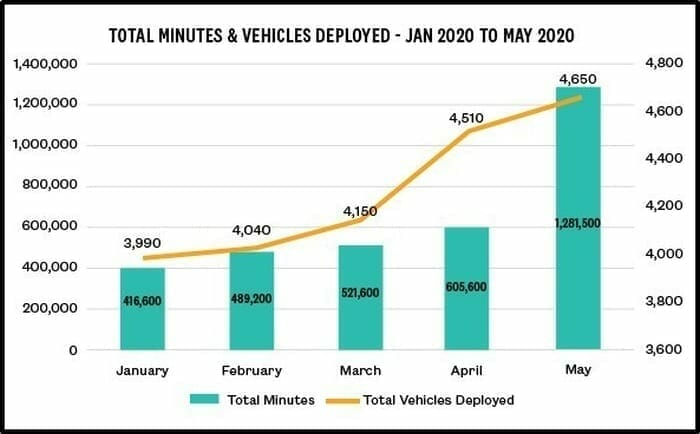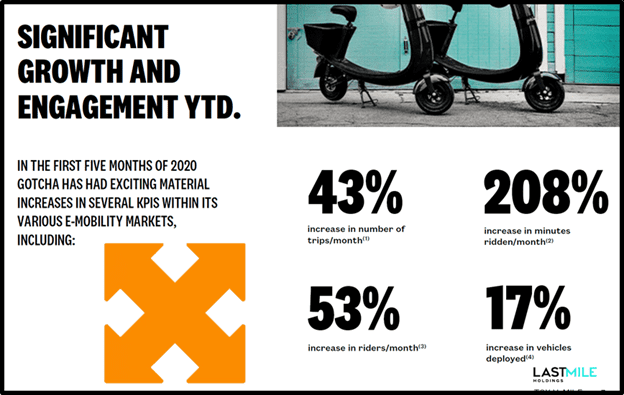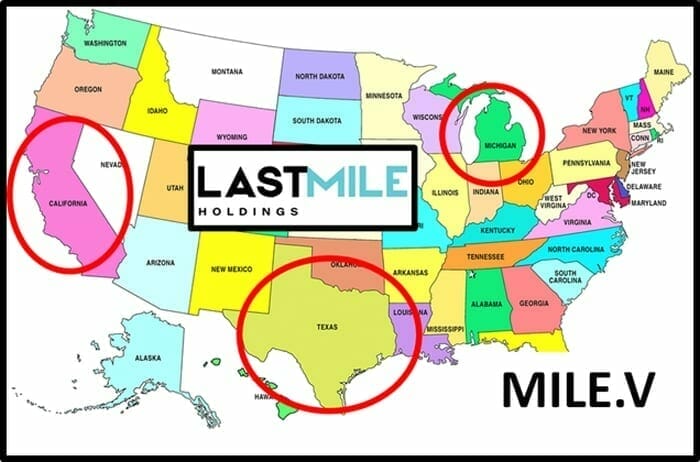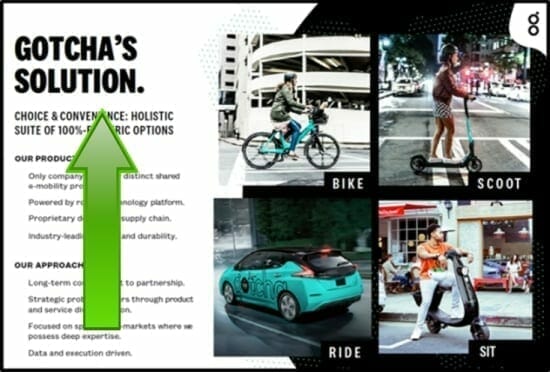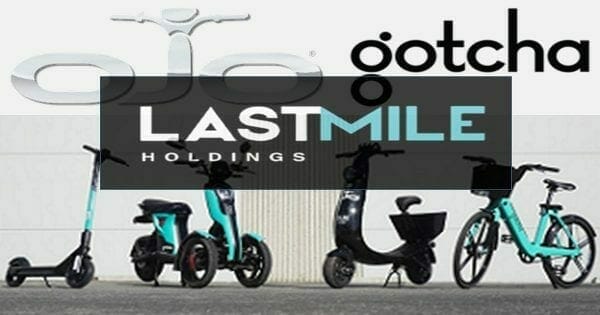When your entire business model involves launching hardware into a public sphere where it will be passed hand-to-hand amongst a group of strangers, you could be forgiven – in the midst of a pandemic – for usage contraction.
On June 17, 2020 Last Mile Holdings’ (MILE.V) released an update on Key Performance Indicators (KPIs) of its shared electric mobility Gotcha Mobility.
Last Mile’s ridership did not contract.
It expanded.
Sharply.
January-May 2020 Gotcha experienced increases in numerous KPIs within its various e-mobility markets, including:
- 43% increase in number of trips per month from 36,200 in January to 51,900 in May;
- 208% increase in minutes ridden per month from 416,600 in January to 1,281,500 in May;
- 53% increase in riders per month from 13,300 in January to 20,300 in May;
- 17% increase in vehicles deployed from 3,990 in January to 4,650 in May.
To review, three months ago Last Mile announced the acquisition of Gotcha Mobility, focusing on university campuses in the U.S.
With a focus on university and small to midsize municipalities, Gotcha has secured permits to deploy approximately 20,000 vehicles, 80% of which are exclusive.
With 80 combined locations, MILE is the third largest micro-mobility company by location in North America, after Lime and Bird.
“Throughout the continuing COVID-19 pandemic, Gotcha has executed, “comprehensive product cleaning procedures and safety messaging.”
“Gotcha’s record performance year to date is a clear endorsement of our diversified platform of transportation solutions,” stated Last Mile CEO Max Smith. “Our exclusive contract partnership model has proven to be far more resilient than other mass-expansion, undifferentiated offerings.”
“Last Mile’s companies are taking an alternate route to growth,” reports Equity Guru’s Chris Parry on May 15, 2020.
“Instead of the Uber-inspired path of least municipal resistance – basically, “HERE’S 1200 SCOOTERS, CITY X! TWEET AT US IF YOU FIND ONE IN THE LAKE. IF YOU HURT YOURSELF, RUB SOME DIRT ON IT. DON’T TELL UR PARENTS!” – Ojo and Gotcha chose the path of increased resistance – and responsibility – namely, “Here’s 30 sit down mopeds and a spot the city is comfortable with them being in, that are speed-limited to 20mph or less, and that we’ll wipe down every few days. If they break, we’ll fix them. Please be careful.”
If that sounds a little like Gotcha is the ‘Karen’ of e-scooters, they’re okay with that, because that’s what cities are looking for.
Council member Dickie Thompson thanked the staff for finding a company that knows what it means to be a “reasonable corporate citizen in Raleigh.”
“We sure didn’t hit that on the last couple of folks,” recalled Thompson.
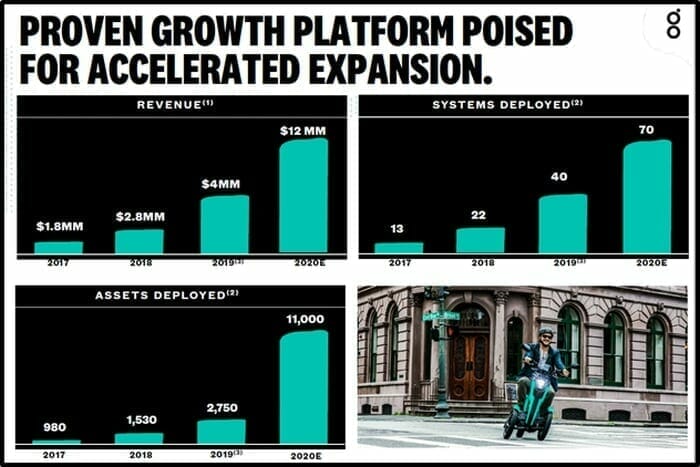 Two months ago, Last Mile announced a new delivery service for restaurants, grocery stores, and other local businesses.
Two months ago, Last Mile announced a new delivery service for restaurants, grocery stores, and other local businesses.
It’s a smart adaptive mechanism to offer local business an alternative to being gouged by food delivery companies.
Gotcha’s sit-down scooters and/or e-bikes will be available to these hard-hit vendors for $15 per day to deliver goods to customers – allowing local businesses to cut out 3rd-party delivery services, which typically charge 20 to 30 percent per order.
In this pt.1 Last Mile Podcast, Equity Guru’s Guy Bennett talked to Last Mile CEO Max Smith about the importance of “exclusive contracts”, the company’s prestigious seed investors – and how innovative technologies create new revenue streams.
In this p.2 Last Mile Podcast, Mr. Bennett talks to Mr. Smith about insurance, app functionality, retail partnerships, manufacturing, expansion capital and 2020 milestones. “The Service today is to move people,” explains Smith, “The service tomorrow is a lot more.”
June 22, 2020 update: Veteran public company executive Kate Marley will become the CFO of Last Mile, effective July 6, 2020.
Most recently, Marley served as Controller of the Engines division at Meggitt, a multi-billion-dollar international aerospace contractor based in the United Kingdom. Prior to that Marley held additional Controller-level roles at Ixia, American Homes 4 Rent, Jakks Pacific, DTS, and THQ, respectively. Marley also previously held positions at Disney Publishing and PricewaterhouseCoopers (PwC).
“We believe Kate is uniquely qualified to help us realize our operational goals, including enhanced financial reporting as well as driving improvements in our industry-leading unit economics,” stated Smith.
Last Mile also announced operating subsidiary Gotcha Mobility Founder and CEO Sean Flood and COO David Touwsma have tendered their resignations to the Company’s Board of Directors, respectively.
“Sean and David have built a great team at Gotcha, and we are appreciative of their efforts over the years, especially through this transition period as we successfully integrated our two companies,” added Smith.
“Riders are taking longer leisure trips, using shared bikes and scooters as a way to get outside while adhering to social distancing guidelines,” stated Smith on June 17, 2020, “We believe the current catalysts will lead to longer term changes in consumer behaviour specifically within our key markets.”
– Lukas Kane
Full Disclosure: Last Mile is an Equity Guru marketing client


